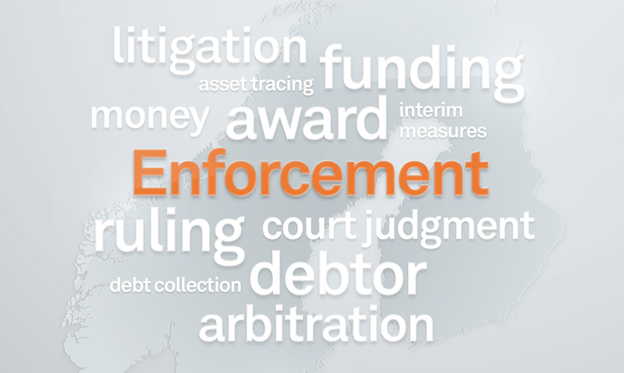
Insights | April 13, 2018
Roschier Disputes Index 2018: Nordic companies report a low level of familiarity with third party funding
The recently published 2018 edition surveys enforcement-related experiences among the largest companies in Denmark, Finland, Norway and Sweden, including themes such as debt collection, enforcement of judgments and external funding of legal proceedings.
The fifth edition of the Roschier Disputes Index, Roschier’s biennial survey on dispute resolution in the Nordics, has been published. The survey, conducted together with Kantar Sifo Prospera, investigates and tracks developments in Nordic companies’ view of commercial dispute resolution and management of their disputes. Altogether 143 organizations responded to this year’s survey.
How to “get the money” after a favorable judgment or award is a key question for any company. Equally, the time and cost of forced execution, which may prove necessary if the losing party refuses to pay, can constitute significant barriers to successful recovery. The survey examines these issues, including the prevalence of voluntary payment, the use of advance means to secure recovery, and external funding opportunities.
The survey’s overall finding is that debt collection and enforcement of judgments do not normally cause difficulties for large Nordic companies. In their experience, the vast majority of cases show that the losing party will volunteer payment after a judgment or award is rendered. However, enforcement proceedings can prove burdensome when they become necessary. In addition, respondents consider enforcement abroad even more difficult. In particular, the results indicate that enforcement attempts outside Europe often prove timely and costly, causing uncertainty for companies.
From an international angle, Nordic companies appear to have surprisingly limited awareness and experience of third party funding of arbitration or litigation. The data indicate that only 5% of Nordic companies have used an investor company to fund litigation or enforcement proceedings. A mere 17% report a willingness to consider funding schemes in the future. However, those respondents who have actually used third party funding have had positive experiences, finding it cost-efficient and convenient. These experiences suggest that funding arrangements in Nordic disputes have room to grow in the future.
“The key findings of the survey confirm our understanding that non-payment is generally not an issue for Nordic companies and that the majority of payments are made voluntarily in accordance with the judgment or award,” comments Johan Sidklev, Partner and Head of Roschier’s Dispute Resolution practice in Sweden. “While the dispute resolution landscape in the Nordics is stable and arbitration continues to be the preferred method of dispute resolution overall, the survey shows that there are significant differences among countries when scratching the surface.”
Read the full report here.
Further information:
Johan Sidklev, Partner, Head of the firm’s Dispute Resolution practice in Sweden, Roschier
Tel. +46 8 553 190 70 | johan.sidklev@roschier.com
Aapo Saarikivi, Partner in the firm’s Dispute Resolution practice in Finland, Roschier
Tel. +358 20 506 6577 | aapo.saarikivi@roschier.com
Milena Romberg, coordination of interviews
Tel. +358 20 506 6517 | milena.romberg@roschier.com
Roschier is one of the leading law firms in the Nordic region. The firm is well-known for its excellent track record of advising on demanding international business law assignments and large-scale transactions. Roschier’s main offices are located in Helsinki and Stockholm. The firm’s clients include leading domestic and international corporations, financial service and insurance institutions, investors, growth and other private companies with international operations, as well as governmental authorities.
With some 255 lawyers and practitioners in Finland and Sweden, and a vast network of established relationships with leading law firms, Roschier is internationally recognized as top tier in all of its core practice areas.